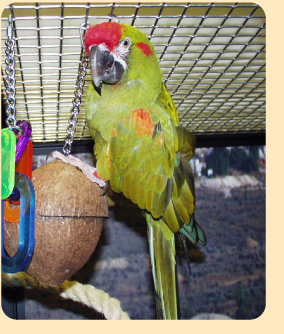 |
|||
|
|
|||
|
 Parrots can be rewarding pets, but they can also be very challenging to live with in your home. Parrots are one of the most intelligent groups of birds in the world and caring for them can be both time consuming and costly. If you are considering sharing your home with one of these birds, there are several important factors to consider: Parrots can be rewarding pets, but they can also be very challenging to live with in your home. Parrots are one of the most intelligent groups of birds in the world and caring for them can be both time consuming and costly. If you are considering sharing your home with one of these birds, there are several important factors to consider:Parrots require specialized care and housing. They will need an appropriately sized cage, as well as toys, perches, and other basic needs. Parrots also require a varied diet – although seeds are okay for a treat, parrots need to eat a well-balanced pelleted diet, along with fruits, vegetables, and other fresh foods. Parrots also need to visit a specialized avian vet at least twice per year, which can be costly. Also, parrots live much longer on average than pets like cats and dogs. Small parrots like parakeets and cockatiels can live 15 years or more. Medium sized parrots like Amazons and African greys can live upwards of 40 years. Large macaws may live 80+ years! Parrots are social animals. The social behaviors that make them such engaging companions can also lead to some of the most common questions and complaints the National Aviary receives from parrot owners. Parrots communicate in the wild by screaming and calling loudly to other members of their flock – in a home, they often call to keep in touch with their owners if they are out of sight. Additionally, parrots tend to bond in the wild with just one other parrot. This means that they often bond very strongly to one member of the household. While this can be a rewarding relationship for their owners, it can also mean that pet parrots will not welcome attention from other members of the household and can even become aggressive. Parrots are intelligent. Parrots are widely recognized to be some of the most intelligent birds in the world, with studies ranking some parrots at the same level of development as a young child. This means that parrots are capable of learning a myriad of complex behaviors and cues, and they are very responsive and engaging with their owners. However, like young children, parrots require a lot of time, interaction, patience, socialization and enrichment. If they do not receive enough opportunities to display natural behaviors and to exercise their minds and bodies, parrots can quickly develop undesirable behaviors. These behaviors can take the form of pacing, screaming, aggression, or chewing/plucking their own feathers. Once they begin, it can be difficult to get parrots to stop such behaviors. If you are prepared to share your home with one of these incredible birds, the last factor to consider is where you acquire your new pet. The National Aviary strongly encourages prospective parrot owners to consider adopting a parrot from a rescue. The National Aviary collaborates with P.E.A.C. (Parrot Education and Adoption Center) which works in the Pittsburgh area to find new homes for pet parrots whose owners are no longer able to care for them. By adopting a bird from a rescue, you can provide a home for a parrot in need and avoid contributing to the pet parrot overpopulation problem. If you choose to purchase a pet parrot, it is important to ensure that the bird comes from a reputable breeder – parrots around the world remain at risk of poaching for the pet trade. If you have further questions about caring for, training, or enriching the life of a pet parrot, the National Aviary offers two workshops in cooperation with P.E.A.C. - Parrot Behavior and Care and Pet Parrot Enrichment. For more information on these workshops, click here. For more information about parrot adoption or to register for a pet parrot workshop, please visit www.pitpeac.org. |




